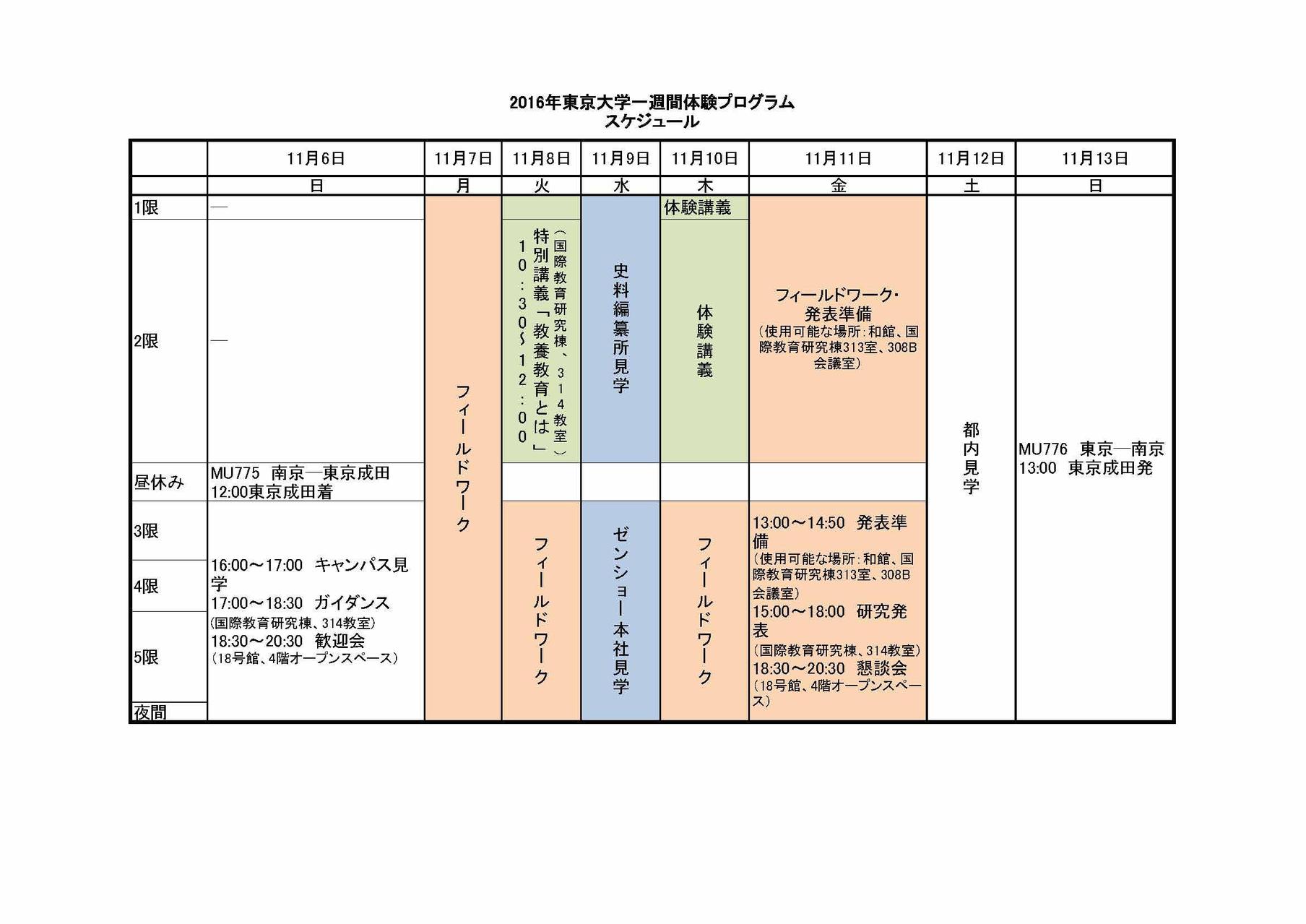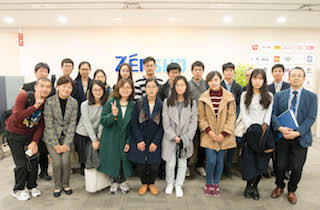I Want to Experience Joint Fieldwork with Chinese Students
One-Week-at-UT Program
Fiscal Year 2016
2018.Sep.19
- Outline
The LAP (Liberal Arts Program) has been hosting various educational programs with the aim of globally promoting the accomplishments of liberal arts education at the University of Tokyo. Specifically, in addition to Intensive Lectures and Theme Lectures held at the University of Tokyo and Nanjing University, we have been hosting student exchange programs “One Week at U Tokyo Program” (Nanjing to Tokyo) and “Nanjing University Intensive Lecture Series Student Exchange” (Tokyo to Nanjing), in which students engage spontaneously in knowledge-production.
“One Week at U Tokyo Program,” which is hosted in early November every year, enables students from Nanjing University to sit in classes in the College of Arts and Sciences as well as Graduate School and learn firsthand about the daily life at U Tokyo. There is also joint research with students at U Tokyo, which provides students from the two schools an opportunity to exchange their opinions and discover another culture, as well as rediscovering the self.Participants
10 Nanjing University students, 10 U Tokyo students
Date
November 6 (Sun) to 13 (Sun), 2016
Joint Research
Theme: Making Your One and Only Tokyo Guide:
The theme for this year is “Making Your One and Only Tokyo Guide.” What might a “Tokyo guide” that only you have look like? What might you find there? You probably will not find the typical shopping places and museums. Let’s make a “Guide” that sheds light on a hitherto unattended perspective and introduces places/things/people. That will require a unique perspective on what Akasegawa Genpei calls “Tomason,” or “the beauty of the trivial,” which is scattered around cities, or a flexible thinking that discovers the “richness” emerging out of people living in the mountains and valleys.
Report
On Visiting Zensho Holdings, Inc. Headquarter (Zhu Yunqi)
In early November, when ginkgo leaves start changing colors, a group of U Tokyo students and students from Nanjing paid a visit to the headquarter of Zensho Holdings, Inc. The moment they stepped out of the Shinagawa station, the tense and busy air permeating the business district that looked like a fictional future city very likely inspired the students, who were used to the academic life on campus.
First, a person from the company explained to us the founding principles, business model, and overseas business of Zensho. Of particular interest to the students from Nanjing were the MMD system and fair trade. The MMD system, in which a company plans, designs, and runs on its own the process from obtaining raw material, production, circulation, to selling the products at stores, makes it possible to “offer safe and tasty food at a reasonable price,” is efficient in terms of company management, and benefits consumers by increasing safe and reliable food options. The students from China may have been all the more intrigued about the system as they were placing a heightened emphasis on food safety. While fair trade is known as a mechanism for supporting producers’ sustainable lives and their improvements by trading with them at a fairer price, Zensho’s fair trade does not just increase the incomes for the producers. It also aims to promote the economic independence of the producers, and promises to use part of the purchasing price as funds for societal development and help build infrastructures for people’s lives and society. Examples include constructions of elementary school buildings and libraries, assistance for water for people’s lives, as well as promoting health education for mothers and children.
It seems to have something in common with the old saying in China, “Give a man a fish and you feed him for a day; teach a man to fish and you feed him for a lifetime.” This means that giving someone fish is never as effective as teaching the person how to fish, and stresses the importance of techniques and methods for independence rather than giving someone goods. The students seemed impressed as this seemed to be precisely the way a corporation should behave and fulfil social responsibility.
After that, we had a chance to hear a person who designs and supervises construction of shops that belong to the Zensho group speak about designing shops. From selection criteria for where to build new shops to the structure and arrangement of the counter in each store, there were a diverse array of questions, which facilitated a lively exchange. Some students from Nanjing were able to apply the specialized knowledge that they had gained in the March Intensive Lectures in Nanjing, and exchange opinions with an expert about the color layout of logos and signs for shops. Through these discussions, the students were able to digest and use the knowledge they had gained, which was now making actual sense to them. By gaining a more firsthand understanding of the knowledge, they will feel all the more motivated towards academics, and the knowledge they acquire will take on deeper meanings. This visit no doubt turned out to be an invaluable experience for both U Tokyo students and students from Nanjing.
- One-Week-at-UT ProgramFiscal Year 2016 Schedule
-


